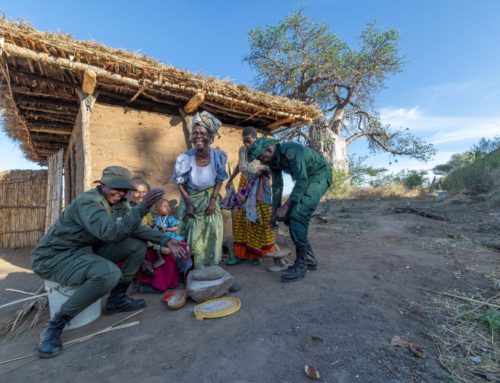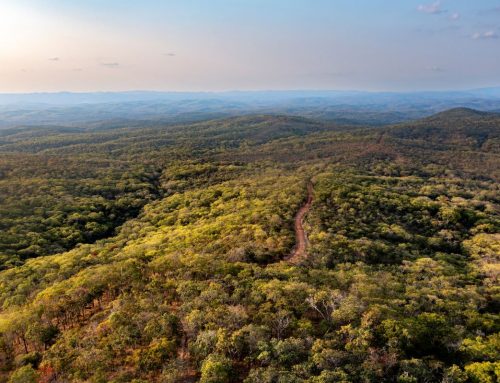 While the high noon sun scorched the savanna, the interview had also grown red hot.
While the high noon sun scorched the savanna, the interview had also grown red hot.
“As you are sitting here asking me about conflicts with wildlife, those zebras are finishing my farm!” a Maasai mzee shouted at the enumerator and then pointed to his field of maize, where, indeed, a group of nine black-and-white-striped equids munched away on the old man’s crops.
“Don’t worry,” responded the enumerator, Lomayani “Komolo” Simel, a coordinator with Honeyguide Foundation. “I’ll take care of them.”
With that, Komolo set down his sheet of survey questions and rushed off to a nearby vehicle of the Burunge Wildlife Management Area.
Sprinting back toward the farm, the young Maasai from West Kilimanjaro carried a handful of Honeyguide’s patented chili bombs, which are actually just firecrackers attached to a chili powder-filled condom. In no time, Komolo set several bombs alight and tossed them over the heads of the zebras — the BANG! and drifting chili clouds immediately caused the herd to run like mad. It even scared off another 17 zebra grazing on the field’s edge.
“Now where were we?” Komolo inquired as he returned to the boma. It was back to the monitoring survey, but this time with a much happier mzee.
In partnership with and via support from Big Life Foundation, Honeyguide has operated in Burunge since last year. After the protection of elephants and wildlife, our initiatives for crop protection and human-wildlife mitigation stand as top area priorities. It has led to a new program, Protecting Farms, Saving Elephants, also in partnership with JUHIBU, the WMA leadership.
That afternoon, Komolo had taken part in a household monitoring exercise in Olasiti Village to gather more information about human-wildlife conflicts, specifically focusing on challenges of elephants and other animals raiding farms.
Perhaps no other place in the world has produced as many studies on wildlife corridors and human-wildlife conflict as Burunge, as it is home to the famed Kwa Kuchinja wildlife corridor, often used by elephants, between Tarangire and Manyara National Parks. Yet implemented solutions to Burunge’s challenges remain as rare as tanzanite when compared to the heaps of studies.
For example, during the main farming season up to harvest, roughly December through July, the great elephants of the Tarangire-Manyara ecosystem can cause havoc for communities, wiping out, for example, a farmer’s crops overnight and thus taking away food from a family’s table.
With collaboration among a cross-section of other key partners, such as Tanzania People and Wildlife and Cornell University, some calculated monitoring and evaluation programs have been established to better understand human-wildlife and human-elephant conflicts in the area. But, with crops growing green and tall and elephant raids increasing by the day, the time to act is now!
The initiative is based on the efforts of Big Life and Honeyguide in the Enduimet WMA, where, due to high demand and success, Honeyguide will distribute some 4,000 chili bombs over this farming season. In Burunge, we plan to implement a much more extensive toolkit of strategies. All Honeyguide staff, village game scouts, and community members involved in the project undergo extensive training on elephant behavior and the use of deterrents to ensure the safety of humans and elephants alike. The Wildlife Conservation Society Elephant Project also recently provided additional expert training for Honeyguide staff.
Currently in Burunge, many farmers stay out all night in vain, banging on pots, wielding flashlights, and throwing stones in trying to ward off elephants and wild animals.
In fact, after he finished his survey that afternoon in Olasiti, Komolo gave whatever remaining sample firecrackers he had to the mzee and trained some of his sons on how to use them properly.
The issue can be complex because expanding agriculture can also cut off wildlife corridors and lead to habitat fragmentation. In similar programs via Big Life and Honeyguide, however, it is such assisted farmers who often become the most loyal informants against elephant and wildlife poachers and supporters of community-based conservation. Honeyguide will not assist farmers who encroach upon wildlife corridors.
So throwing chili bombs might not solve all your problems, but if you live in a place like Burunge, such strategies certainly can make life a little easier.





